Staying ahead in the competitive digital marketing landscape can be challenging, and businesses need effective strategies to thrive.
AI digital marketing is revolutionizing the industry, and failing to leverage its potential may leave you lagging behind.
In this comprehensive guide, I’ll break down what AI digital marketing is and how to benefit from it. Discover innovative approaches, tools, and tactics to harness AI for enhancing productivity, personalization, and campaign effectiveness, propelling your business to new heights of success.
Don’t miss out on the future of digital marketing!
What is AI Digital Marketing?
AI Digital Marketing refers to the integration of artificial intelligence (AI) technologies and tools within your digital marketing processes, strategies, and practices to improve productivity, and results, lower costs, make better decisions, and more.
Infusing AI into your digital marketing and business enables you to enhance your online presence, better engage with your target audience, optimize your marketing effort more effectively and efficiently, deliver better results, and do more with less.
AI-driven and AI-optimized marketing allows you to provide better customer experiences, make data-driven decisions, improve your return on investment (ROI), and automate and simplify many marketing tasks which leads to more successful marketing campaigns and higher revenue growth.
Benefits of AI in Digital Marketing
AI in Digital Marketing offers countless benefits that you as a business owner or marketing professional cannot simply ignore.
By leveraging AI in digital marketing, you can simply achieve better results as AI helps transform everybody into an average marketer.
For example, if you are struggling with email marketing, with AI, you will be able to create decent newsletters or lead nurturing campaigns.
Are you struggling with social media marketing? AI can help you produce decent social media posts related to your industry and target audience.
With AI digital marketing, you and other businesses can manage more channels, produce more content, better copies, and deliver better results.
What used to take 3-5 marketers, now can be done with 1 marketer.
With that, let us look at some of the specific benefits of AI in Digital Marketing:
Enhanced Customer Experience
The first benefit of AI in digital marketing is that it can help you enhance your customer experience by delivering more personalized content, creating better customer segments, and creating better chatbots and virtual assistants for your website or applications.
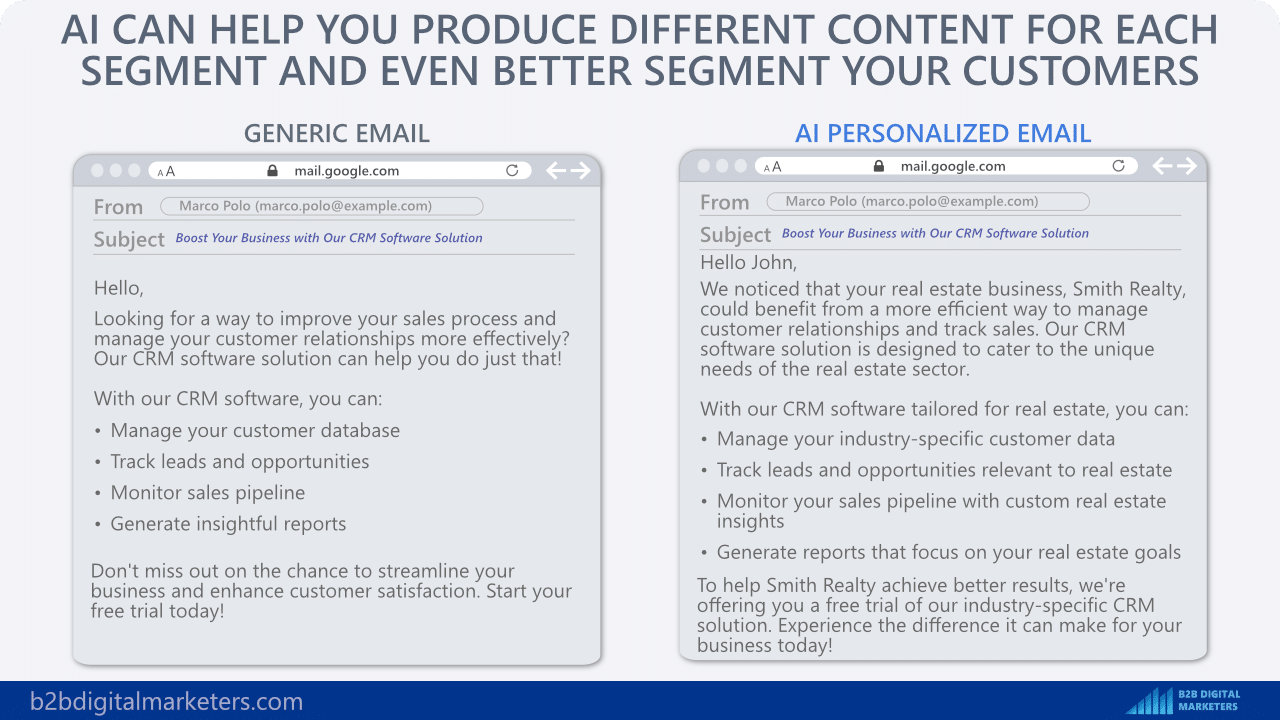
AI enables you to deliver more personalized content and offers to your target audience based on their preferences, your products and marketing campaigns, online behavior, trends, and much more.
Additionally, AI can help you improve customer segmentation by analyzing your customer data and identifying different patterns and trends to improve your customer segmentation. Based on that you can use AI to create more personalized content to directly address those customers in this segmentation.
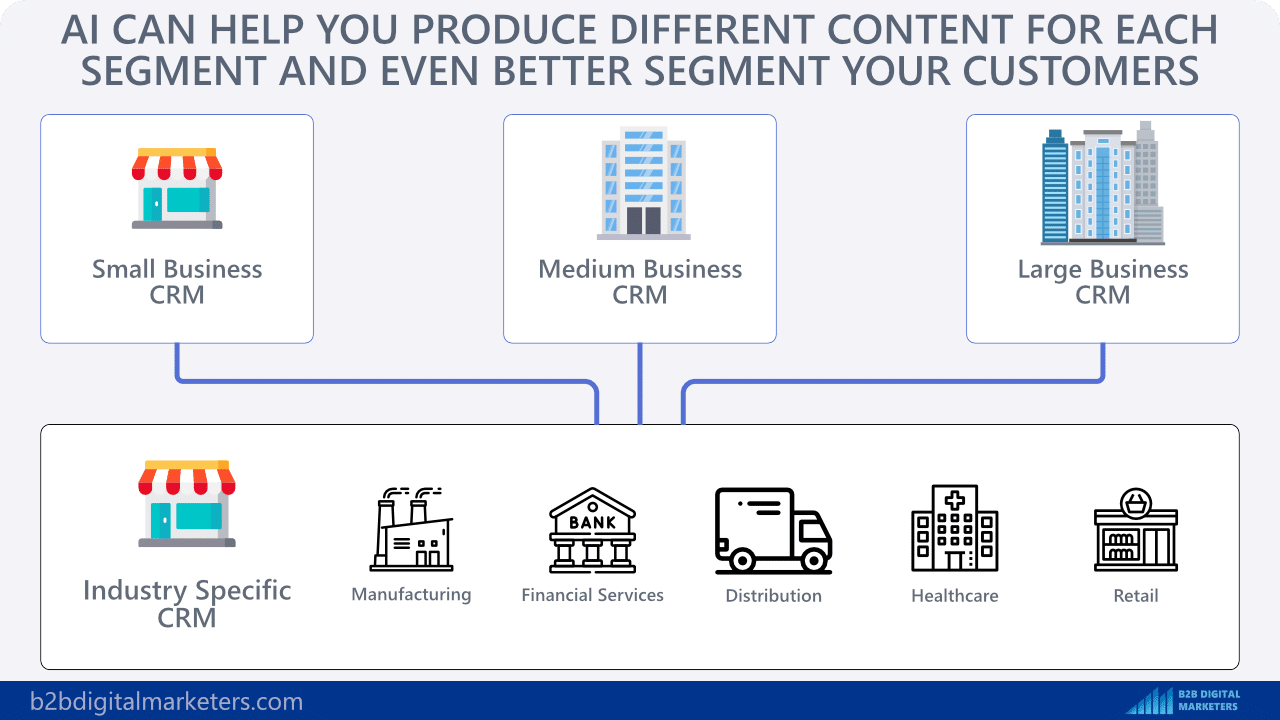
And of course, AI can also help you improve your chatbots or virtual assistants to deliver more personalized interactions by better understanding user queries and providing better answers or content to help your users. AI chatbots and AI virtual assistants can perform many different tasks for your business, and they play crucial roles in digital marketing.
Improved ROI and Cost Efficiency
AI technologies can also help you improve the ROI and cost efficiency of your B2C or B2B digital marketing efforts. By using AI in digital marketing, you can optimize your advertising campaigns much faster and better, better allocate your marketing budget, and reduce labor costs in managing multiple marketing channels.
For example, Google is already using advanced AI advertising technology to enable advertisers to get better ROI from their advertising budget.
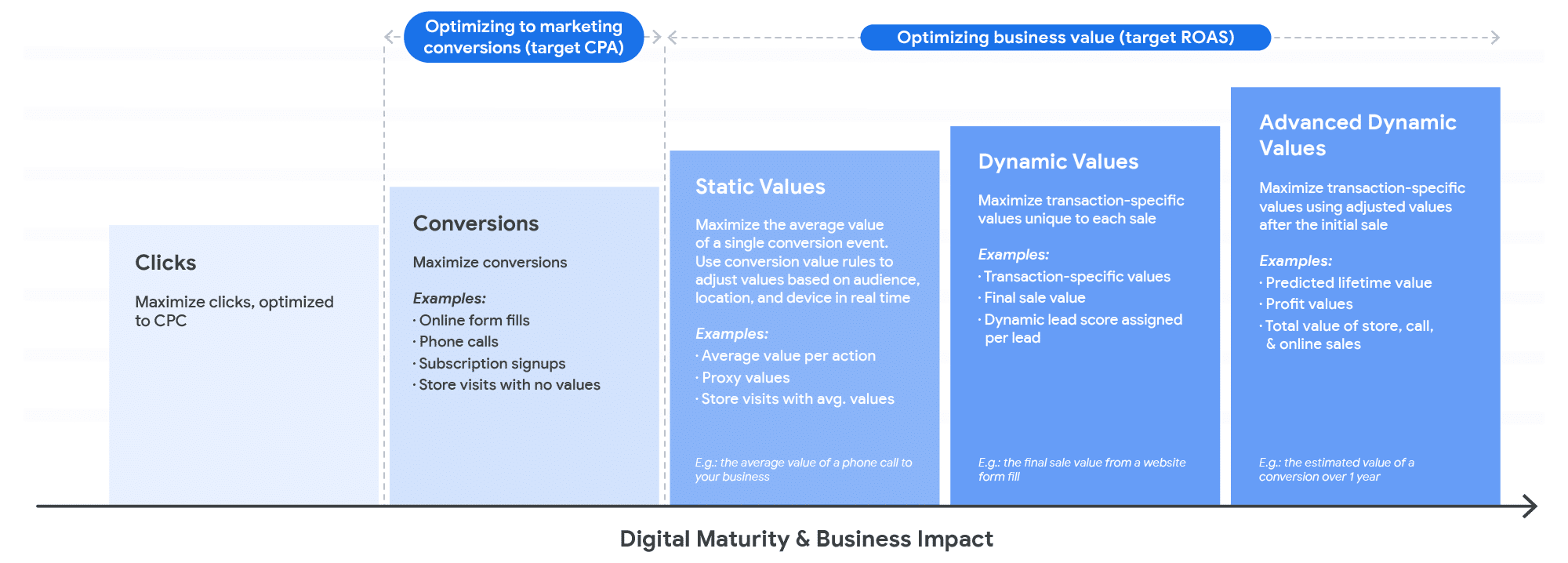
(Source)
But for you as a business, using AI can help you produce more content, improve messaging, deliver more personalization, and much more.
For example, you can quickly create headlines and descriptions for your Google search ads to improve your conversions, CTR (Click Through Rate), relevancy, and lower CPC (Cost Per Click).
And of course, there are countless ways AI can help you produce more and better-quality content from drafting emails, producing blog posts, creating web pages, videos, and much more.
With AI, one person can do what a small marketing team could do 10-15 years ago.
All this helps you to reduce the overall cost of your marketing as one person can do more, deliver better results and bring better ROI for your business.
Automating and Simplifying Tasks
AI in digital marketing has the massive potential of automating and simplifying various of your marketing tasks, allowing you to manage your marketing effort more efficiently and effectively.
Through this, you can save time and resources and deliver better results.
Also, your marketing professionals can focus on more strategic level and creative aspects of the work rather than getting bogged down in tedious writing, repurposing, and rewriting content.
For example, you can easily repurpose your blog content into several social media posts, or quickly create relevant social media posts for your executives to be posted.
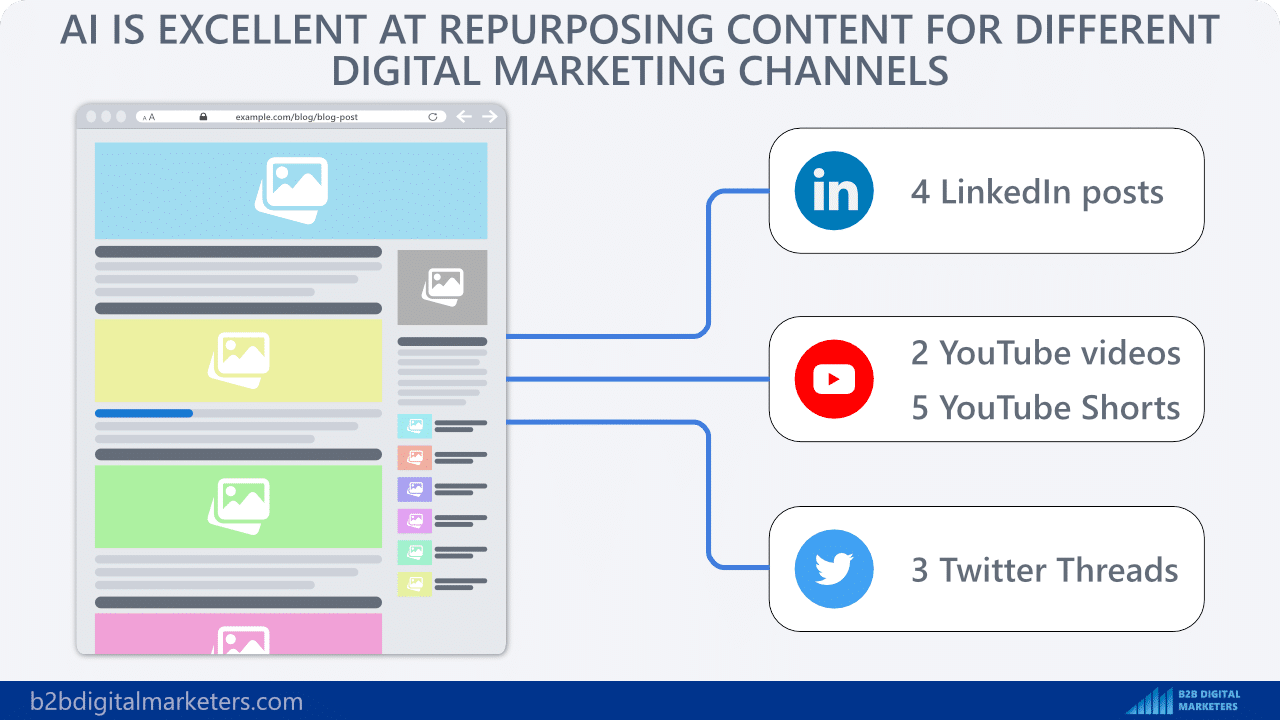
You can also improve your email marketing by creating more lead nurturing sequences specifically targeting certain segments and target personas. Improve the copies of it, headlines, preview text, and much more.
And of course, AI can help you with overall content creation and curation reducing the time spent on content creation and distribution.
Data-Driven Decisions
And the last benefit of AI in digital marketing that I want to mention is using it for data-driven decisions.
AI is an excellent technology when it comes to improving your data analytics and making better decisions in your marketing.
It can help you analyze vast amounts of data and provide valuable insights into your campaigns, website performance, and users.
This will allow you to make more informed marketing decisions, leading to improved campaign performance and increased revenue growth.
From using predictive analytics to help you analyze historical data and predict feature outcomes, sentiment analysis to analyze your text data (such as social media posts or product reviews), to customer behavior analysis to analyze customer behavior data, such as browsing history, purchase patterns, and interactions with marketing content, to provide valuable insights into customer preferences and motivations.
All these AI technologies can help you improve your decision making, better understand your customer preferences and motivators, resulting in more engaging content and effective marketing campaigns, be it content marketing, advertising, or SEO (Search Engine Optimization).
And you should be monitoring the latest AI digital marketing trends to stay competitive and use this technology to deliver better results.
Use Cases of AI for Digital Marketing
AI helps us revolutionize the way we do digital marketing enabling us to optimize our B2C or B2B digital marketing strategies and tactics to achieve far better results with fewer resources.
There are many ways how we can use AI for digital marketing to streamline our efforts across different marketing channels and create more content and more targeted and personalized content on these platforms giving us opportunities to grow our businesses.
With that, here are some of the use cases of AI in digital marketing:
AI Content Marketing
AI Content Marketing refers to the use of AI in creating, optimizing, and distributing content to reach and engage your target audience. It helps you to streamline the content marketing processes, saves you time, and improves the content quality, helping your business to achieve better results with fewer resources.
By utilizing AI in your content marketing, you can benefit from creating more content from your already existing content, optimizing your targeting, improving your messaging, and easily creating A/B testing in order to improve your content performance and reach more of your B2C or B2B target audience.
AI in content marketing has countless ways how it can help you improve your marketing and here are some of the use cases how I like to use AI for content marketing:
- Content Idea Generation: AI helps me to get more ideas about what types of content I should create be in on LinkedIn, Forums, Press Release, YouTube, or other digital marketing platforms. Using tools like Copy AI or ChatGPT to help you get more ideas is an excellent way to brainstorm some content ideas for whatever platform you use.
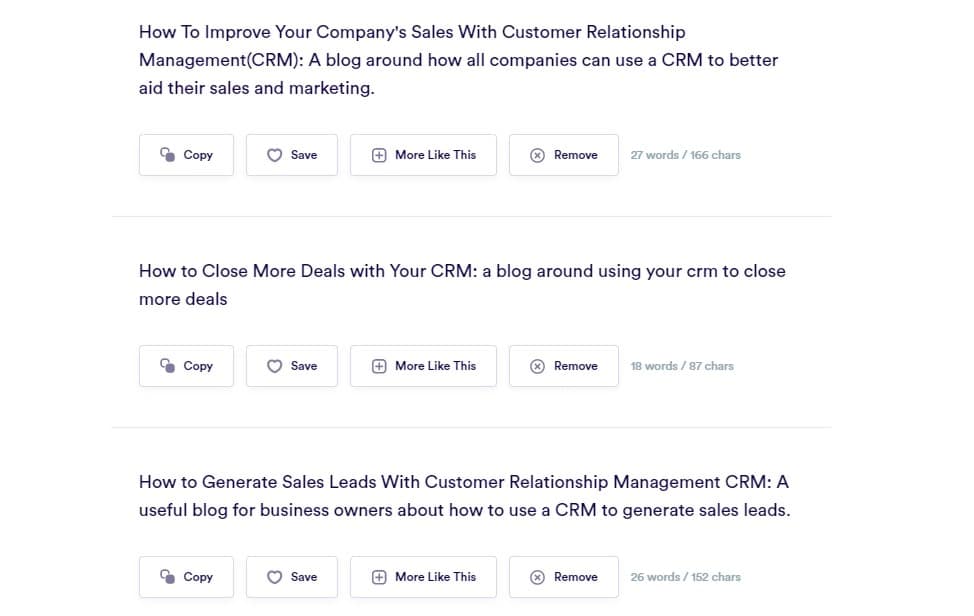
- Content Repurposing: Arguably the best way to use AI for content marketing is to repurpose my existing content such as blog posts into different formats such as YouTube videos and shorts, LinkedIn posts, Twitter threads, or Forums. AI is ideal to maximize your content marketing efforts.
- Content Personalization: AI helps me to improve my messaging to make it more personalized and relevant to my target audience. Especially when I am creating email marketing sequences, using AI to guide me with my messages improves my CTR and response rate.
- Content Optimization: Lastly, I like to use AI to help me improve the readability of my content, remove writer’s block, provide more ideas, expand my topic, and assist me with my writing.
Embracing AI content marketing can help your business create more content, and more engaging, high-quality performing content that drives better results and fosters stronger relationships with your audience.
But remember that you cannot simply press a button and take the content it generates. You should see it as an assistant that helps you in real-time to improve your content production.
AI Email Marketing
AI Email Marketing is a process of leveraging AI to create, optimize, and deliver more personalized email campaigns to engage and convert your email subscribers or target audience. By using AI in your email marketing efforts, you can improve your open rates, click-through rates, and overall email marketing performance.
By utilizing AI in your email marketing, you can benefit from more effective targeting, personalized messaging, and overall better customer engagement as you will be able to create more finely segmented personalized email campaigns to meet your subscriber’s needs, preferences, and interactions that resonate with your audience.
AI has huge potential in email marketing and here are some of the use cases how I like to use AI for email marketing:
- Content Personalization: AI can take your general emails and recreate them for different segments of your target audience, creating more personalized emails based on your subscriber’s interest. It is much easier and faster to create more fine-tuned emails that target only specific groups of people. For example, now you can create emails only targeting owners of Chihuahuas instead of just owners of small dogs. Your campaigns now can be even more targeted without the need to have a large email marketing team.
- Lead Nurturing Sequence: Additionally, you can create more email lead nurturing campaigns for your specific lead magnets, eBooks, or different contents, and again deliver more personalized and targeted email marketing campaigns.
- Content Repurposing: You can easily take some of your best content and repurpose it into newsletters. For example, I like to take my best tips within my blog posts and create short email newsletters to connect with my readers.
- A/B Testing: AI helps you to easily create A/B testing for your emails to find which version performs the best. For every email, I create I always make sure I am running A/B testing to optimize my email marketing performance and with AI it is much easier to do so.
Of course, AI can also help you automate your email marketing workflows or analyze your performance and provide detailed analysis to improve it.
And as time goes on, we will see even more use cases of using AI for email marketing what currently we cannot even think of.
AI Blogging
AI Blogging refers to the use of AI to create, optimize, and publish blog content on your website that attracts and engages your target audience from organic search and ultimately converts into leads or sales. By incorporating AI into your B2C or B2B blogging strategy, you can produce content faster, and improve the quality and relevancy of the content, while also improving the SEO part of blogging.
By employing AI in blogging, you can create more engaging and valuable content, improve the ranking of your content, and increase your website’s organic traffic.
AI can analyze your text for any SEO keywords and semantics to help search engines better understand what your content is about while keeping the natural flow of the content, and until now, probably AI has been used the most for blogging in digital marketing.
With that here are some of the best use cases of using AI for blogging that I and other marketers use:
- Content Repurposing: As I said, I and many other marketers love to use AI to repurpose their content into different content types such as videos, social media posts, or forum posts. Just this alone can double your brand awareness and lead generation.
- Blog Topic Generation: AI is also excellent to give you topic ideas that you can target. For example, I like to use it as a starting point for my clients, when I do not know the industry and then based on that start doing keyword research.
- Content Creation: Perhaps the biggest change AI will bring is in making content, as it allows you to create content faster, and more accurately while keeping the content quality. Of course, it is not just clicked and paste method, but it is a valuable assistant that helps you while you are writing.
- Grammar Optimization: AI can significantly improve your writing by identifying and correcting grammar, spelling, and punctuation errors in your blog content. By using AI-powered grammar-checking tools, you can ensure that your content is polished, professional, and free from errors that could damage your credibility and negatively impact user experience.
- SEO: AI can help you enhance your blog’s search engine optimization (SEO) by analyzing your content, suggesting relevant keywords, and optimizing meta tags, headings, and internal links. With AI-driven SEO tools, you can improve your content’s visibility on search engine result pages (SERPs) and attract more organic traffic to your website.
- Plagiarism and duplicate content detection: AI-powered tools can scan your blog content to ensure it is original and free from plagiarism, which is crucial for maintaining search engine rankings.
So far, AI blogging, especially AI for blog posts, is the most popular method of using AI in digital marketing and it has been widely used by marketers, bloggers, and SEOs to produce high-quality content.
AI Social Media Marketing
AI Social Media Marketing is a process of leveraging artificial intelligence to create, optimize, distribute, and publish engaging social media posts across various social media platforms as well as analyze data to improve your overall social media strategy. By incorporating AI into your social media marketing efforts, you can increase your brand awareness, increase audience, and engagement, get more followers, improve your omnipresence, and drive more conversions efficiently.
By utilizing AI in your social media marketing, you can create more effective targeting, improve B2C or B2B marketing personalization, increase your reach, and improve your audience engagement, be it on LinkedIn, Twitter, Instagram, or other social platforms.
AI algorithms also help to analyze user behavior, preferences, and interactions to create data-driven social media content that resonates with your target audience and drives results.
With that here are some of my favorite ways of using AI for social media marketing:
- Content Repurposing: AI is fantastic when it comes to repurposing existing content into different formats suitable for various social media platforms. It helps you get more mileage out of your content, maximizing your brand’s reach and engagement.
- Content Planning: AI can help you develop a well-structured content calendar, considering the best times to post, trending topics, and user preferences. This approach ensures that your social media campaigns are timely, relevant, and appealing to your target audience.
- Content Creation: AI makes content creation for social media much easier and more efficient. By providing suggestions, auto-generating captions, and even creating visuals, AI can assist you in crafting engaging content that resonates with your audience.
- Content Idea Generation: AI is excellent for generating fresh and creative content ideas for your social media campaigns. By analyzing trends, keywords, and audience interests, AI can provide you with a list of captivating topics to keep your social media presence vibrant and engaging.
- Sentiment Analysis: AI-powered sentiment analysis allows you to monitor and understand the emotional reactions of your audience to your social media content. By analyzing these emotions, you can refine your messaging and tailor your content to evoke the desired responses from your target audience.
AI Social Media Marketing is something you will see a lot more as influencers and brands are already using it to produce content at a bigger scale and, 70-80% of the content that you are seeing is already AI-created or optimized.
AI SEO
AI SEO or artificial intelligence for search engine optimization is a process of using AI-driven tools (Surfer SEO, SE Ranking, Copy AI, etc.) and SEO techniques to optimize your website, content, and overall online presence to rank higher on search engine results pages (SERPs). AI can help you produce more SEO-friendly content as well as analyze your vast amounts of data to uncover patterns and provide insights that can help you make smarter decisions regarding your SEO strategy.
With AI you can improve your keyword targeting, optimize your content for keyword placement, improve the semantic SEO as well as improve other parts of your SEO such as technical SEO or on-page SEO.
With that here are some of my favorite ways of using AI for SEO:
- Keyword Research: AI is exceptional at uncovering the best keywords for your niche by analyzing search volume, competition, and user intent. This ensures that your content targets the right keywords to drive organic traffic to your website.
- Create Custom Schema Markup: AI can help you generate custom schema markup for your website, making it easier for search engines to understand your content and improving your chances of ranking higher in SERPs.
- Improve/Create Title Tag & Meta Descriptions: AI-driven SEO tools can assist you in crafting compelling title tags and meta descriptions that accurately reflect your content and appeal to both search engines and users.
- Improve Content Quality: AI can provide real-time feedback and suggestions to enhance readability, keyword usage, and overall content quality, ensuring that your content is optimized for search engines and your target audience.
- Produce More Product/Service Pages: AI can help you create and optimize additional product or service pages, making it easier for potential customers to find your offerings through search engines.
- Optimize for Technical SEO: AI can detect and help you fix technical SEO issues, such as broken links, crawl errors, and slow page load times, ensuring that your website performs at its best and maintains high search engine rankings.
- Blogger Outreach: AI can help you improve your blogger outreach by creating personalized messages at scale, resulting in a better outreach process and results from your link building.
AI has a wide range of use cases of how it can help you improve your SEO efforts, drive more organic traffic, and improve your conversions.
AI can also help you improve your website conversion rates and much more. Again, there are more use cases for using AI for websites, SEO, and Conversion Rate Optimization.
AI Advertising
AI Advertising refers to using artificial intelligence technologies to streamline and optimize your advertising campaigns and the entire advertising process. AI-Driven tools can help you improve your advertising performance by crafting more personalized messages, automating or streamlining your testing, analyzing your data, and increasing your productivity.
AI for advertising has been an invaluable assistant to me in creating advertising campaigns whether it is for me or my clients and here are some of my favorite ways of using AI for advertising:
- Ad Creation: AI-driven tools have helped me design visually appealing and effective ad creatives by analyzing top-performing ads and generating design suggestions tailored to my target audience. For example, when creating a Facebook ad campaign for a client, AI provided me with multiple ad design options based on their niche and audience preferences.
- A/B Testing: AI has streamlined the A/B testing process by automating the creation and comparison of different ad variations. When I ran a Google Ads campaign, AI helps me produce different messaging for my Google Ads to improve ROI.
- Audience Targeting: AI has enabled me to identify and target the most relevant and high-converting audience segments based on user behavior, demographics, and interests. For instance, when I ran a LinkedIn ad campaign for a B2B client, AI helped me pinpoint the ideal audience segments by analyzing their industry, job titles, and company size, leading to higher engagement and conversion rates.
- Ad Optimization: AI has assisted me in optimizing my ads in real-time, based on user behavior, conversion rates, and competition. When running an Instagram ad campaign for a fashion brand, AI helped me adjust ad placements, bids, and targeting, ensuring that the ads reached the most relevant users and maximizing the return on investment (ROI).
- Landing Page Creation: AI helps me to create high-converting landing pages for different industries by providing suggestions on copies (headlines, descriptions) and design for landing pages which results in a faster and better landing page creation process.
Overall, AI for advertising, especially AI for PPC (Pay Per Click) is an important assistant that can help you produce better ads, improve your performance, and ultimately get better ROI from your marketing budget.
Best Practices for Implementing AI in Digital Marketing
As I showed you, AI in digital marketing is super important for your marketing efforts because it gives the ability to produce more content, better quality, and much faster.
And your competitors are already using AI in all kinds of ways to improve their digital marketing results.
Therefore, to stay competitive you must start using AI in your digital marketing as well.
You should be implementing AI at a strategic and tactical level, whether it is planning, developing, or executing your digital marketing efforts.
However, using AI has its own risk. Thus, you should be super careful with the way you are using it.
With that here are some of the best practices for implementing AI in digital marketing that I recommend you should follow, and I follow them myself:
Investing in AI Skills and Training for Your Marketing Team
The first important practice of implementing AI for digital marketing is to start investing in AI skills and training for your marketing team or yourself.
Learning and understanding how to use AI for your digital marketing is essential to maximize the benefits of AI technology.
This approach will enable you to implement AI solutions more effectively, sidestepping common pitfalls and errors. By gaining a deeper understanding of the AI tools and techniques best suited for your team, you can consistently enhance your digital marketing strategies.
So, you or your team needs to start exploring the different AI digital marketing tools available on the market, as well as start testing them for your own needs.
The best way is to focus on your biggest digital marketing challenges and start searching for relevant and useful AI tools that could help you to solve them.
Integrating AI Tools with Existing Marketing Strategies
Another important best practice is to start integrating AI tools into your already existing marketing strategies and find ways to automate and streamline some of your marketing efforts.
To fully benefit from using AI in digital marketing, you must start thinking about where you would need help the most.
- What processes are the most important in your marketing?
- Which processes take the most time and are harder to complete for your team?
- Where do you spend the most money?
- Are you using freelancers for some parts of your digital marketing?
Addressing these questions can assist you in pinpointing the aspects of your digital marketing processes that could benefit from AI integration.
Let me give you a few examples.
Example #1: Using AI to develop Ad & Social Creatives.
A client of mine was spending a lot of time and money on freelancers to develop ad creatives for social media, search, or other platforms.
The issue was that it could take somewhere between 3-10 days (about 1 and a half weeks) from an idea for a marketing campaign, producing the creative, to start advertising. Additionally, the client had to spend money on different freelancers and the results were not always consistent or meet the branding or feel.
All this resulted in lost opportunities and also reduced the ROI of the marketing campaign.
So, the client found an AI tool called AdCreative.ai that helps to produce ads and social media creatives super-fast, keep the consistency, branding, and look and feel the same, and it was much cheaper and easier to use this tool.
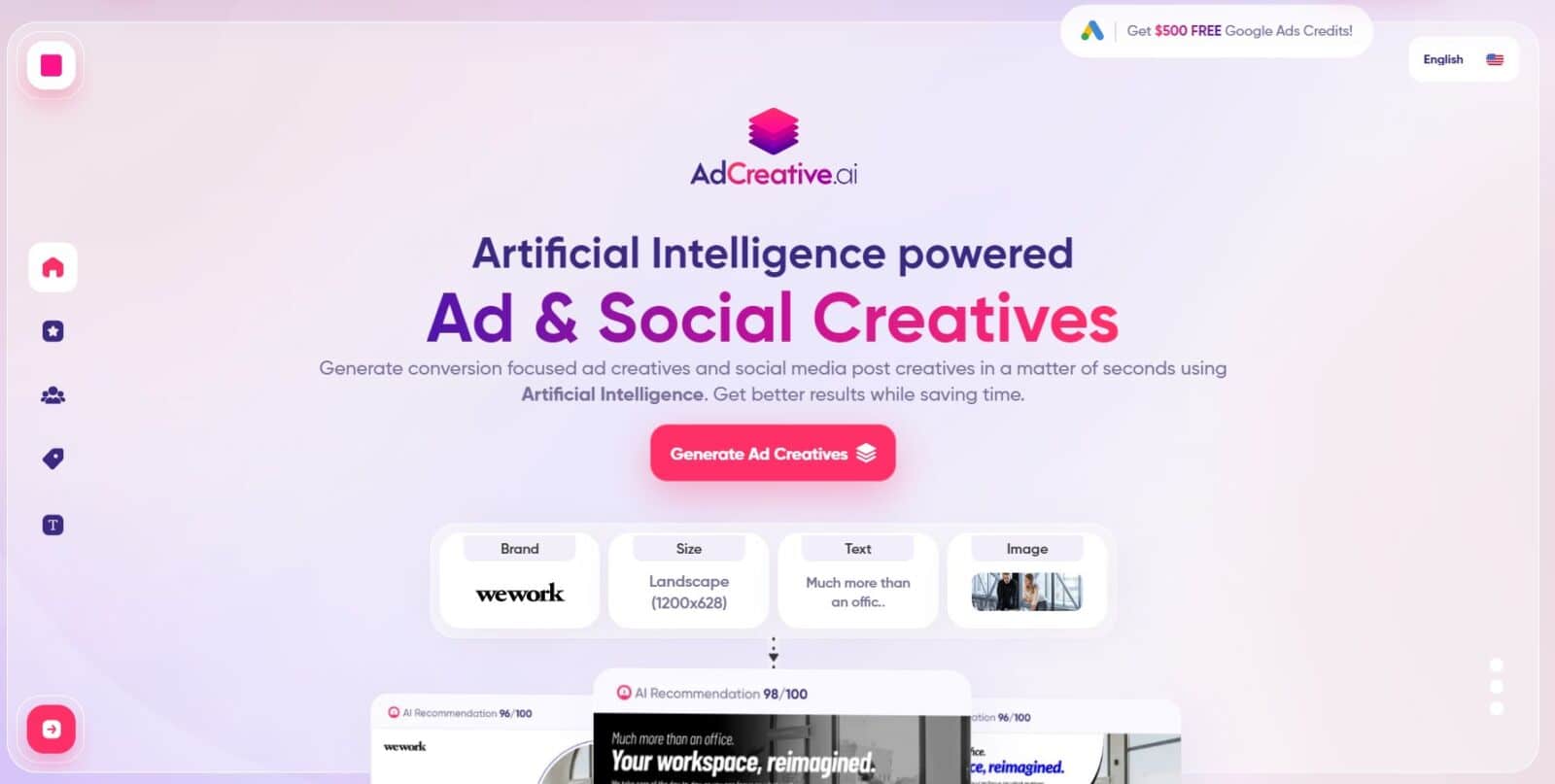
So, for this client, integrating this AI tool into their marketing processes was not only cheaper but resulted in much better results and they now can develop ad creatives within a few hours, sometimes even minutes.
Example #2: Repurposing Content
This example comes from my own challenges.
For every blog post, I produce I also want to repurpose it into a YouTube video. However, it can take up to a few hours to rewrite the blog post into a script and cut some of the less valuable information to keep it shorter.
But with ChatGPT, I can now rewrite the script in less than 30 minutes and focus more on producing more content.
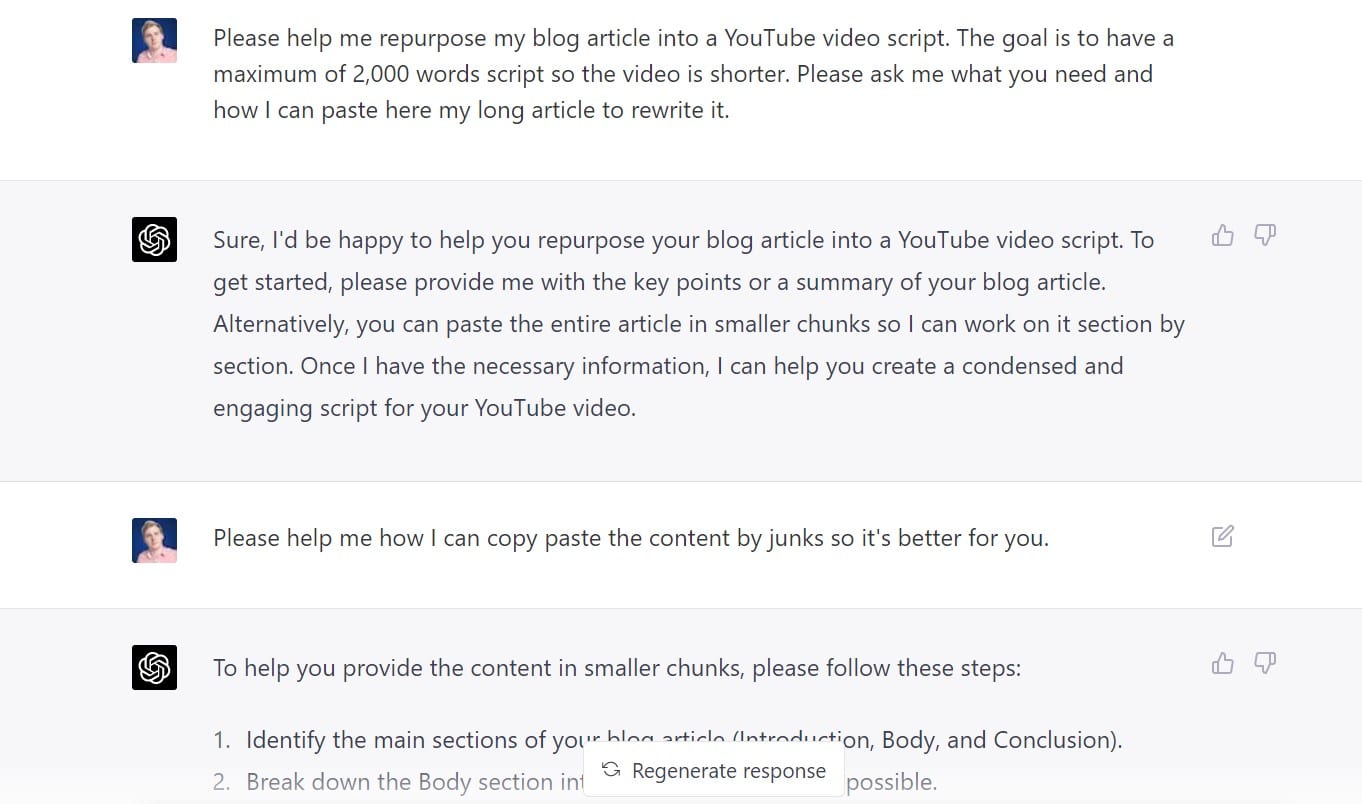
Additionally, ChatGPT can also help me to pick important information within the script to produce YouTube shorts. Again, this helped me reduce the time of producing content and maximizing the value of my produced content.
And there could be countless more examples of how you can integrate AI marketing tools into your digital marketing processes.
Remember, you should start focusing on those processes that limit you most, you have a tough time doing it, or simply just bother you.
Responsibly Using AI Tools for Marketing
As you start using AI tools for your marketing, it is essential that you use AI responsibly, ensuring that your marketing efforts remain ethical, and relevant, align with industry standards and regulations as well as you are providing quality and true information.
Here are some things you should be careful about when using AI:
- Transparency: If you are using AI to process your customers’ information, it is important to disclose how their data is collected, processed, and used to deliver personalized marketing experiences.
- Data Privacy: Comply with data privacy regulations like GDPR and CCPA, ensuring that customer data is handled securely and responsibly while using AI tools for marketing purposes.
- Informational Accuracy and Quality: AI is prompt to make up stuff and information, so the information provided by AI must be always reviewed by industry experts. Remember the Google introduction of BARD? The AI in it wrongly claimed the James Webb Space Telescope took the first-ever picture of an exoplanet. That was an expensive mistake.
- Ethical Consideration: Be mindful of potential biases in AI algorithms and ensure that your marketing efforts are inclusive, and fair, and do not inadvertently discriminate against any groups or individuals.
- Monitor & Review: As you start using AI increasingly, you will become an AI manager and AI will be your assistant/worker to do certain tasks. And while in most cases you will see improvements in your digital marketing efforts, it is not always like that. So, make sure you monitor and review and impact of using AI for your marketing efforts.
Continuously monitoring and refining AI applications
And the last best practice for implementing AI for digital marketing is to continuously monitor and refine the use of AI applications within your marketing.
This will help you to achieve long-term success with AI in digital marketing as the technology is still evolving, new applications constantly flood the market, and the technology is getting better and more user-friendly.
So, it is important that you continuously monitor and refine the use of AI in your business, keeping up with evolving technologies, trends, and customer expectations.
We can expect the level of personalization will double or triple and your customers will no longer tolerate vague, not relevant emails based on their interests and even past interactions.
With that here are some of the ways how you can monitor and refine the use of AI applications for your business:
- Track Performance: As previously mentioned, simply implementing AI does not guarantee improved outcomes. I have witnessed numerous bloggers and businesses excessively relying on AI for their content creation, only to be penalized by Google’s algorithms. Additionally, engaging, human-like email newsletters have been replaced by bland, AI-generated ones, prompting me to unsubscribe. It is crucial to monitor the effectiveness of AI and ensure a balance between automation and the human touch.
- Continuous Learning: This technology is still new and there are many ways how you can and how should use the technology for your marketing. So, make sure you learn from people who are using it, how they use it, what mistakes they made, etc.
- Encourage Feedback: Make sure you collect feedback from your employees who use it as well as customers, subscribers, or users to find out if the AI has a positive or negative effect.
- Adapt and Evolve: As said, AI is new and a lot of things keep changing, from new regulations and laws to market conditions, or competitive landscapes change, you must make sure that you adapt to using the technology to meet new standards and not break any laws.
- Stay Up to Date: Employing AI in digital marketing and various aspects of your marketing strategies presents numerous use cases and increases the potential for errors. Therefore, it is essential to follow those using AI for similar purposes, ensuring that you consistently implement best practices, avert mistakes, and remain compliant with the law.
The Future of AI in Digital Marketing
Undoubtedly, AI is here to stay and represents the next major revolution in marketing since the advent of the internet. This transformative technology will fundamentally alter the way we conduct business, promote our enterprises, and attract customers.
The level of personalization, B2C or B2B marketing automation, and data-driven decisions we will be able to make with AI will greatly increase and in my opinion, it will improve the marketing from a customer point of view.
I believe marketing will become a lot more personalized and relevant to the audience, which is something that really excites me about AI.
How AI Will Shape Digital Marketing
Digital marketing will change thanks to AI. It will become better, faster, more personalized, and less predictable than it is currently.
However, AI gives marketers new opportunities to improve their results, generate higher ROI, do more with less, improve the quality of their content and so much more.
AI will definitely change a lot of things we do in marketing for the better or worse.
But there are especially few areas where I expect the biggest changes:
- Enhanced personalization: With AI we can create a lot more personalized content be it through chatbots, email marketing, social media, or other marketing channels. With AI we can tailor content, offers, and experiences for individual users at a much greater scale.
- Innovative Content Creation: Content creators including myself will rely increasingly on using AI to create content. However, this will allow us to spend less time on the actual creation of the content and spend more time on being innovative, unique, and different because having just content is no longer a competitive advantage as everybody can produce substantial amounts of content at scale. So, it will come down to the differentiation and uniqueness of the content. Something that really excites me, is that even smaller players now can beat big companies.
- Improved automation: AI is great at automating repetitive tasks. I imagine that optimizing Google Ads and changing headlines and descriptions will soon become automatic and we do not have to spend every month or few weeks changing these to improve CTR and conversions. Or automating email campaigns based on user behavior triggers, such as cart abandonment or content downloads. Or using AI to determine optimal posting times and automatically schedule content across multiple platforms. Or automating the testing process for different marketing elements (headlines, layouts, etc.) to optimize conversion rates. And I could provide a lot more examples of how AI can automate marketing tasks.
- Advanced Analytics: AI is excellent at interpreting data into actionable and understandable insights that humans can use. Data always played important roles in businesses and decision-making, but AI will take this to another level and many tedious aspects of decision-making will be automated by AI. It gives us deeper insight into our customer’s behavior and preferences.
- Hyper-Targeted Advertising: This approach allows businesses to improve their advertising ROI, engagement, and conversion rates by focusing on individuals who are more likely to be interested in their products or services. Rather than focusing on segments or groups of people, digital marketing and digital advertising will become a lot more individual, targeted, and personalized which will lead to better ROI and UX.
There are many areas where AI will make a significant impact on digital marketing and the way we work, and these are just a few ways I see will be impacted the most.
Of course, as technology is getting better, there will be a lot more opportunities that currently we do not see or even do not imagine just like with the internet revolution.
And marketers like you and me are lucky to be at the beginning of this revolution as we can learn about this from the beginning and help companies to generate more leads or revenue through marketing with the help of AI.
What Challenges and Ethical Concerns can we Expect?
While AI is not as new as it seems like, it was limited only to the very few companies with the budget to run AI models and train them.
But now, with ChatGPT offering opportunities for almost anyone to build AI apps and providing free or very affordable access to many, it has introduced several challenges and ethical concerns. These include:
- Factual Incorrectness: AI cannot discern right from wrong and it generates content based on algorithms and available data. This creates the risk of AI producing factually incorrect or misleading information. If not carefully reviewed and fact-checked by experts, this can have extremely negative effects on society. Therefore, experts must verify the information generated by AI to ensure accuracy and credibility and maintain content quality.
- Data Privacy: It is also important for companies to adhere to best practices of data privacy and how we collect and use user data for marketing purposes. It is important that we as marketers follow the latest privacy regulations provided by the lawmakers of specific countries and be ready that new regulations to be introduced or amended to protect the privacy of users.
- Algorithmic Bias: AI systems may unintentionally favor certain narratives or lean towards one side of a story due to biases in their training data or underlying algorithms. This can result in skewed marketing messages that may not accurately represent diverse perspectives or customer interests. To mitigate this risk, it is important to involve marketers with the right expertise to review and amend AI-generated content as necessary. By incorporating human oversight, organizations can ensure more balanced and inclusive marketing campaigns that effectively cater to diverse audiences. In the end, we still market to humans.
- Workforce Impact: The rise of AI in digital marketing may cause concerns about job displacement and changes in required skill sets. To navigate this challenge, organizations must invest in upskilling and reskilling employees to adapt to AI-driven roles. Encouraging collaboration between human experts and AI systems can also help maximize the benefits of AI while maintaining human oversight and creativity.
- Regulatory Compliance: As AI becomes more prevalent in digital marketing, companies must stay updated on evolving regulations and guidelines related to AI usage. Compliance with these rules is essential to maintain trust and avoid legal consequences. Marketers should also proactively follow industry standards and ethical principles to ensure responsible AI use in marketing, fostering transparency and accountability.
There are many challenges ahead of using AI in digital marketing and many things will change. Something will get harder over time, some things will get easier, and some things will disappear.
So, we must stay current with the latest AI digital marketing trends to adapt our digital marketing trends. I will keep updating you on the latest AI marketing best practices.
How to Prepare Yourself for AI-Driven Digital Marketing
For some, it might be a big bite to chew on, but AI will stay here, and it will become a lot more common across digital marketing practices.
So, our responsibility as marketers to our employers or customers is to prepare ourselves and take advantage of this technology to improve the marketing ROI, be it by using it to improve productivity, results, or output.
So, in order to effectively prepare for an AI-driven digital marketing future, marketers and organizations should take several key steps to adapt and thrive in this rapidly evolving landscape such as:
- Embrace Change and Innovation: AI is an innovative technology and there are a lot of opportunities for how we can use it. So instead of fighting against using this technology, embrace it and start thinking about innovative ways to use it to solve your problems. Develop a growth mindset and be open to exploring new AI-driven technologies, tools, and techniques. Stay informed about the latest trends and advancements in AI and digital marketing.
- Invest in Skills Development: As I said, this is new technology and many new applications are coming to the market every day. So, make sure you try some that may seem relevant to your needs or problems. Invest in AI courses, workshops, certifications, consulting, or in learning to improve the skills of your employees and yourself.
- Foster Collaboration: This goes two ways, collaborate with those that have knowledge and experience in using AI to help each other. Additionally, encourage cooperation between human expertise and AI systems to maximize the benefits of both. Recognize the strengths and limitations of AI and work together to create more effective marketing campaigns.
- Monitor and Optimize AI Performance: Recognizing the importance of collaboration between humans and AI in digital marketing is essential. Foster a culture of open communication and teamwork, leveraging the strengths of both human expertise and AI capabilities to create more successful and efficient marketing campaigns. Encourage your team members to share feedback on AI-generated content and insights and use their expertise to refine and optimize AI-driven strategies. By nurturing this collaborative environment, organizations can maximize the potential of AI and human creativity, achieving better results in digital marketing initiatives.
- Stay informed on regulations: Keep up to date with evolving AI-related regulations, guidelines, and industry standards. Ensure compliance with legal requirements and proactively adapt to changes in the regulatory landscape.
By focusing on these points, you can maximize your digital marketing results, while staying competitive, and avoid any pitfalls of AI technology.
Final Thoughts on AI Digital Marketing
A lot of changes are coming to digital marketing, and we will have to adapt our marketing strategy to take advantage of the technology to stay competitive, bringing better results for our company or customers.
However, it is still too early to say what exactly will change, how lawmakers will limit the use of this technology, and how exactly we can use it.
But it is clear that digital marketing strategies will be AI-driven, and marketers will rely on this technology more and more as it improves.
AI Digital Marketing FAQs
In this AI Digital Marketing FAQs section, we’ve tackled some of the most common questions about this game-changing technology. From boosting productivity to personalizing content, discover how AI is revolutionizing the digital marketing world and helping marketers achieve greater success!
AI revolutionizes digital marketing by automating content creation, optimizing keywords and headlines, streamlining targeting, enhancing customer segmentation, enabling chatbots, and analyzing data for improved ROI and customer experiences.
AI will not completely take over digital marketing but will significantly transform it, automating repetitive tasks, enhancing decision-making, and enabling more effective strategies, while human creativity and insights remain essential.
AI impacts digital marketing by automating tasks, enhancing targeting, personalizing content, utilizing chatbots, and optimizing campaigns, ultimately improving human productivity and skills while complementing creativity and expertise.
Benefits of AI in digital marketing include automation, enhanced targeting, personalized content, chatbot integration, data-driven insights, improved campaign effectiveness, and increased human productivity, all contributing to better customer experiences and ROI.
Related Articles:
Also, check out our digital marketing hub page to find all our digital marketing resources.
Disclaimer
This article was created by Eduard Dziak and may contain affiliate links. The following were used to optimize the article for the best user and search engine experience include:
- SE Ranking for keyword research and on-page SEO optimization
- Surfer SEO for SEO-friendly content creation for users and search engines.
- Jasper AI for grammar correction and information enhancement.
The article is based on the author’s own experience and knowledge, drawn from both their own work and that of their clients, to provide the latest, proven methods.



